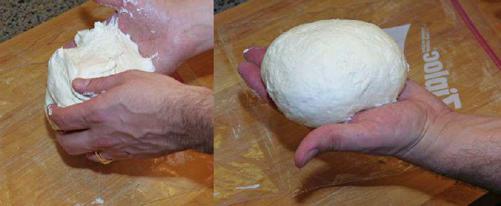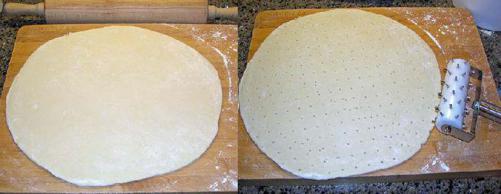Passionate About Pizza: Making Great Homemade Pizza (24 page)
Read Passionate About Pizza: Making Great Homemade Pizza Online
Authors: Curtis Ide
Tags: #Baking, #Cookbook, #Dough, #Pizza


Shaping
–
Roll, stretch, or hand-toss this dough into shape.
Handling
– Basic Pizza Dough (or any dough with oil in it) has a tendency to stick to the pizza peel. Use a sufficient amount of flour and cornmeal on the peel to ensure that the dough can slide off; any extra cornmeal will fall off the pizza onto the stone as it bakes.
Baking
–
You will typically bake this dough at 500˚ on a stone, in a pan, or on a pizza screen unless directed otherwise by a specific recipe.
New York-style Dough – Dough Recipes
New York-style Dough
The name says it all. If you want the most authentic New York-style Pizza, use this dough. This is like basic pizza dough without the oil and sugar. Using bread flour gives the crust its distinctive crunchy, chewy crust. Leaving out the sugar gives the yeast less to feed on and results in a thinner crust. Leaving out the oil results in more dough strength and lets you toss around the dough without it stretching too large, too quickly.
Pizzerias make their dough in large batches hours ahead of time. The dough sits as dough balls for several hours in a cooler before it is used. In fact, they make dough balls immediately after kneading the dough. Because the dough conditioners and commercial equipment are difficult to duplicate at home we will not use them. This recipe works well as it is.
Use New York-style Dough for thin-style pizza baked on a stone. Makes one fourteen to sixteen inch pizza.
1 cup lukewarm tap water (105 – 115 degrees F)
1 teaspoon (about 1/2 package) active dry yeast (not quick-rise)
2 1/2 to 3 cups unbleached bread flour
1 teaspoon salt
unbleached bread flour (for kneading and shaping)
Flour
– You can vary the amount of flour in the dough within the range given in the recipe. Using two and a half cups will result in softer dough that is easier to stretch and has a lighter crust. Using two and three quarters to three cups will result in stiffer dough that is better for tossing around.
Mixing
– Pour the water in a large mixing bowl and sprinkle in the yeast; stir gently for a few seconds. Let stand a few minutes to let the yeast dissolve and become active. Since there is no sugar for the yeast to feed on yet, the bubbles may not be very noticeable.
Add one cup of the flour and the salt. Mix thoroughly until the mixture is smooth. Add one and a half cups of flour and mix well. The dough should come together and will be somewhat sticky with lines of flour noticeable. You may need to add up to an additional half-cup or so of flour if the dough is too wet or sticky.
Kneading
–
Knead the dough until the dough is smooth and elastic and no bits of raw white flour show. The dough should no longer feel sticky. Rather, it should be somewhat elastic and should spring back when pressed. Shape the dough into a ball for rising.
Rising
– Because this dough has less yeast and no sugar, it will rise less than other dough. Do not be concerned if it does not double in size.
Shaping
–
Shape this dough by hand stretching and assemble the pizza on a pizza peel or pizza screen. You can vary the thickness of the stretched dough by decreasing the amount of dough you use. If you want thinner pizza, cut off a piece of dough before you begin shaping. If you want thicker pizza, do not stretch it as far.
Baking
–
Bake this dough at 500 degrees Fahrenheit on a stone or on a pizza screen.
Variation
– Add 1 – 2 Tablespoons of olive oil to the dough when mixing.
Sicilian-style Dough
This dough forms the basis for the big, thick pizzas made by old-style bakeries and pizzerias. The larger recipe lets the dough rise extra thickly in the pan and the extra olive oil gives it a bread-like crumb.
Use Sicilian-style Dough primarily for thick-style pizza baked in a pan. You can also bake it on a screen or on a stone. Makes one eleven and a half by seventeen-inch pizza.
1 1/2 cup lukewarm tap water (105 – 115 degrees F)
1 teaspoon sugar
1 package (about 3/4 Tablespoon) active dry yeast (regular or quick-rise)
1/4 cup olive oil
4 to 4 1/2 cups unbleached all-purpose flour
1 1/2 teaspoons salt
unbleached all-purpose flour (for kneading and shaping)
Mixing
– Pour the water in a large mixing bowl and sprinkle in the sugar and the yeast; stir gently for a few seconds (do not worry if the yeast is not completely dissolved). Let stand until it starts to get foamy. You should begin to see the yeast multiply; it will produce bubbles and clumps that rise to the surface of the water.
Pour the oil into the yeast mixture and add one and a half cups of the flour and the salt. Mix thoroughly with a wooden spoon or wire whisk. Add two and a half cups more flour and mix well. The dough should come together and be fairly dry. You may need to add up to an additional half-cup or so of flour if the dough is very wet or sticky.
Kneading
–
Knead the dough until the dough is smooth and elastic and no bits of flour show. It should feel somewhat elastic and should spring back when pressed. Shape the dough into a ball for rising.
Resting
– If you want to press the dough into shape, let the dough rest directly in an oiled pizza pan. If you plan to roll the pizza into shape, place the dough between two layers of plastic wrap to rest.
Shaping
–
If you let the dough rest in an oiled pizza pan then press into shape. Alternatively, roll the rested dough into shape and place the rolled dough in an oiled pizza pan. Either way, you should typically let the shaped dough rise in the pan for an additional ten to twenty minutes before assembling the pizza.
Baking
–
Bake this dough at 500 degrees Fahrenheit on a stone, in a pan, or on a pizza screen unless otherwise directed by a specific pizza recipe.
Variation
–
You can use half all-purpose unbleached flour and half bread flour.
Cornmeal Dough

This is corn-fed pizza dough from the corn-fed Midwest! It is amazing what a little cornmeal can do to give body, texture, and taste to this dough. You can use beer in place of the water for even richer tasting dough!
Use Cornmeal Dough for thick-style pizza baked in a pan. Makes one fourteen inch pizza.
1 1/4 cups lukewarm tap water (105 – 115 Degrees F) or beer
1 teaspoon sugar
1 package (about 3/4 Tablespoon) active dry yeast (regular or quick-rise)
3 Tablespoons corn oil (olive oil or vegetable oil may be substituted)
3 1/4 to 3 3/4 cups unbleached all-purpose flour
1/2 cup yellow or white cornmeal
1 1/2 teaspoons salt
unbleached all-purpose flour (for kneading and shaping)
Mixing
– Pour the water (or beer) in a large mixing bowl and sprinkle in the sugar and the yeast. Stir gently for a few seconds (do not worry if the yeast is not completely dissolved). Let stand until it begins to get foamy. You should begin to see the yeast multiply; it will produce bubbles and clumps that rise to the surface of the water.
Pour the oil into the yeast mixture. Add three quarters cup of the flour, the cornmeal, and the salt. Mix thoroughly with a wooden spoon or wire whisk. Add two and a half cups more unbleached all-purpose flour and mix well. The dough should come together and may be fairly dry. You may need to add up to an additional one-quarter cup or so of flour if the dough is very wet or sticky.
Kneading
–
Knead the dough until the dough is smooth and elastic and no bits of flour show. It should feel somewhat elastic and should spring back when pressed. Shape the dough into a ball for rising. Coat the pizza pan you plan to use with butter or olive oil. Let the dough rest in the pan for a few minutes before shaping.
Shaping
– Press the dough into shape. After shaping, you can let the dough rise in the pan for up to twenty minutes before assembling the pizza if you desire a thicker crust on the finished pizza.
Baking
–
Bake this dough at 500 degrees Fahrenheit in a pan or on a pizza screen unless otherwise directed by a specific pizza recipe.
Cracker-style Dough

This crust is light, crispy, and thin just like a cracker. You keep the crust thin by docking the shaped dough with a fork or dough docker. This connects the top and bottom crusts together. Have you ever noticed the holes in a cracker? They are there for the same purpose.
Use Cracker-style Dough for pizza baked on a pan, on a screen, or on a stone. Makes one fourteen to sixteen inch pizza.
1 teaspoon (about 1/2 package) active dry yeast
1/2 teaspoon salt
2 to 2 1/4 cups unbleached all-purpose flour
2/3 cup very warm tap water (125 – 130 degrees F)
1 Tablespoon melted vegetable shortening or olive oil
unbleached all-purpose flour (for kneading and shaping)